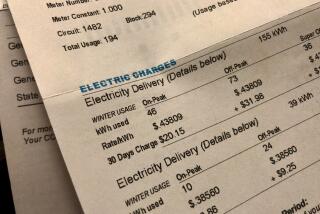Phone Rates Unfairly High, Group Argues : ‘Preferential Treatment’ to Bell Units Is Alleged
- Share via
WASHINGTON — A national consumer organization contended Tuesday that telephone users have been charged $3 billion too much for service since local Bell telephone companies were divested from AT&T; more than two years ago.
The Consumer Federation of America said local telephone companies have been given “preferential treatment” by state regulators and have been allowed to earn returns on their investment that are significantly higher than those earned by other public utilities and some of the nation’s largest corporations.
Releasing the results of a new study on local telephone charges, the consumer group urged state regulatory commissions to take “quick and vigorous action” to adjust rates to reduce the companies’ rates of return.
Charges Denied
Telephone company officials denied that they have been treated preferentially. Gary W. McBee, executive vice president for Pacific Bell, said that the company has benefited from growth in the California economy and noted that the California Public Utilities Commission in January reduced local rates by $120 million.
The consumer group listed the rate of return on equity for Pacific Telesis, Pacific Bell’s parent firm, at 13.7% for the first six months of 1986.
According to the report, the average return on equity for the nation’s top 900 corporations during that period was 10.6% and the return for other utilities was 10.8%. The overall rate of return on equity for the local telephone companies nationally was 14.1%, the report said. Return on equity represents the profits earned in relation to the shareholders’ investment in the company.
Financed a Windfall
Mark N. Cooper, author of the study, said that as a result of the high returns, “residential and business customers have unwillingly financed a $3-billion windfall profit” since the court-ordered divestiture went into effect. Stockholders have reaped a windfall of excess profits at the expense of ratepayers, the report said.
It said that a $3-billion reduction in the companies’ return on equity could result in a 5% reduction in local rates, or a saving of $1 to $2 a month for consumers.
But McBee said the figures cited in the report “are in many cases misstated and lead to the wrong conclusions.”
Gene Kimmelman, legislative director for the Consumer Federation of America, which is a coalition of 200 consumer organizations, said his organization will join with large businesses in urging state utility commissions to review the rate structures of the regulated monopolies. The report’s findings were endorsed by the International Communications Assn., which represents 600 large businesses.
More to Read
Inside the business of entertainment
The Wide Shot brings you news, analysis and insights on everything from streaming wars to production — and what it all means for the future.
You may occasionally receive promotional content from the Los Angeles Times.










